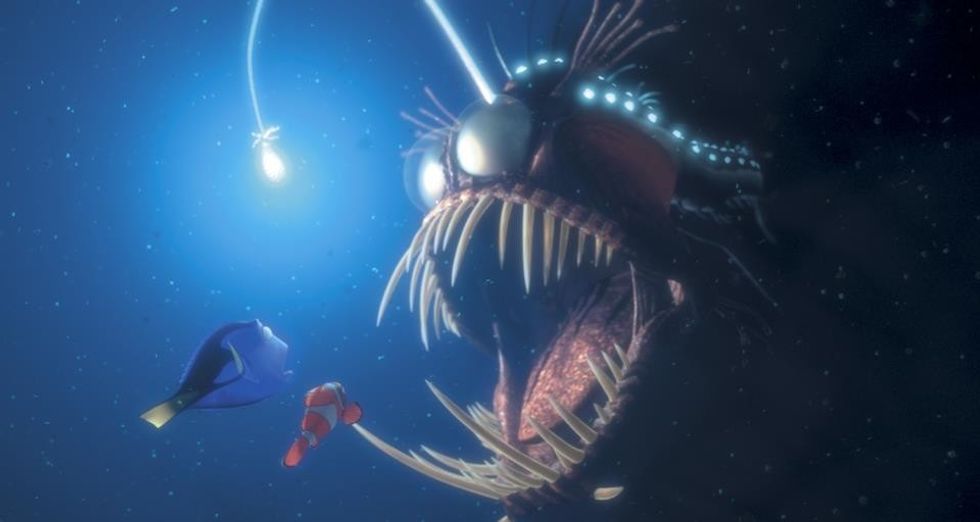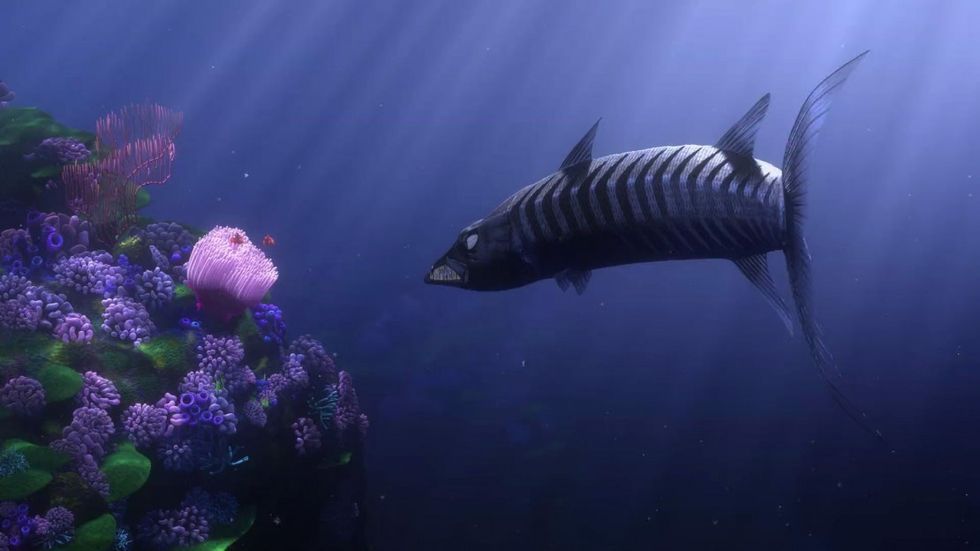An Ode to Marlin, the Greatest Dad in the Seven Seas
He's not the strongest, wisest, or bravest clownfish in the sea, but Marlin from Pixar's "Finding Nemo" is certainly a role model for parents everywhere.

Finding Nemo
Who is your favorite cinematic father? Empathetic and troubled George Bailey from It's a Wonderful Life? Goofy and selfish Clark Griswold from National Lampoon's Vacation? Regal and courageous Mufasa from The Lion King? If you're like me, you gravitate toward on-screen dads that remind you of either your own real-life dad or your closest parental figure, whether they play the hero or the villain. (My dad is equal parts Atticus Finch and Vito Corleone.)
So, let's take a closer look at one of the most complex father figures in film, Marlin, the anxiety-ridden helicopter parent in Pixar's Finding Nemo.
In this video essay, ScreenPrism explores how the overprotective clownfish overcomes his many fears to not only save his son from certain death but to also become the father he needs him to be.
As a kid, you think that your parents are superheroes who can heal every wound, defeat any foe, and give you everything you'll ever need to be happy, healthy, and confident in life. And then you grow up and you begin to see the chinks in their armor—a bit of bad advice, an unwarranted criticism, a fear you don't yet understand. The weight of the crown that adorned their regal brow has turned them into a stooped figure going over mounting bills at a dimly lit kitchen table. The day you learn your parents are human is a traumatizing day, as is the day your kids learn the same thing about you.
The flaw that forces growth in Nemo's Dad
This realization acts as the catalyst for both Nemo's rebellion that leads to his capture and Marlin's decision to venture beyond the reef into the unknown horrors of the open ocean. Marlin's overprotective nature, the very thing that he thought was going to keep his young offspring safe from harm, is the very thing that put them both in danger. And in order to reunite and return to safety, two things must happen: Marlin must summon the courage to take risks and Nemo must summon the courage to believe in his ability to do things on his own.
The struggle to change
Even though Marlin decides to pursue his kidnapped son, the changes he needs to make in order to get him back don't happen instantly. Throughout his entire journey, Marlin is constantly fearful about his surroundings and those in it, from the friendly sharks to the pelican that eventually takes him to Nemo. Unbeknownst to her, Marlin's traveling companion, Dory, constantly challenges his unwillingness to change, which puts them at odds with each other. And unbeknownst to him, he needs to trust her by taking the risks she's willing to take in order to get what he set out for in the first place: his son.

A guide for growth - like Nemo's Dad
Dory becomes a proxy of Nemo, receiving the brunt of Marlin's anxieties, doubts, and fears about the unknown. In fact, at one point, Marlin angrily echoes the line he spoke to Nemo early on in the film to Dory: "You think you can do these things, but you just can't, Nemo." However, Dory's optimism and ability to live completely in the present, rather than dwell in the past like her fearful counterpart, is what helps Marlin realize that taking risks and trusting others can have favorable outcomes.
Facing fears
In the end, the act that ensures Nemo's safe return to his father is the very thing that puts him in the most danger—and Marlin must make the decision to allow him to do it. When Nemo is caught in the tuna net, he must believe in his ability to rally the rest of the fish to swim down toward the sea floor, but in order to do that, he must first gain the trust of his father so he can gain the trust of the helpless fish. Marlin allowing his son to be put in harm's way not only instills confidence in his son but it also heals the wounds he received during the barracuda attack.

Nemo's Dad is a model for parenthood
Marlin is by no means a perfect parent, but I think that's what makes him the perfect role model. He's so frustratingly flawed in the beginning, constantly hovering over Nemo because he thinks bad things don't happen as long as he's there to supervise, which, as we know from his past, isn't true. He's fearful, anxious, and even condescending to those who challenge his irrational beliefs, but he loves—he loves so, so deeply. His great love for Nemo allowed him to not only overcome his greatest fears but to also put his son in his rightful place: first—before his worries and doubts and anxieties.
Now, go watch Finding Nemo and cry like the baby your parents wish you still were.
Source: ScreenPrism











